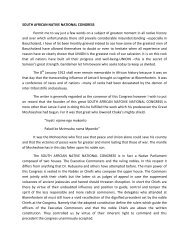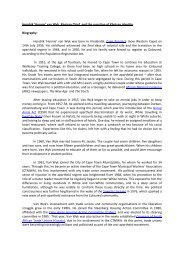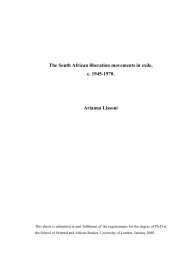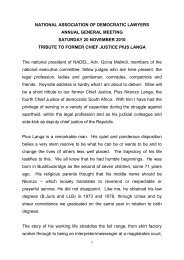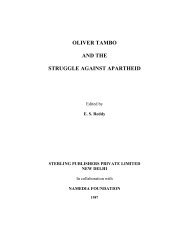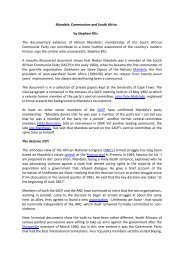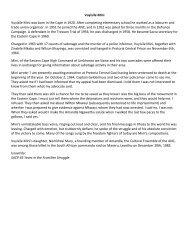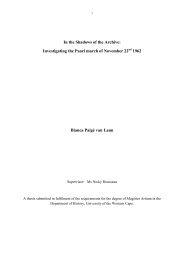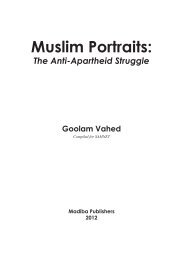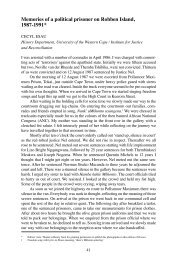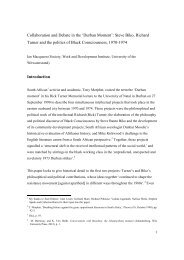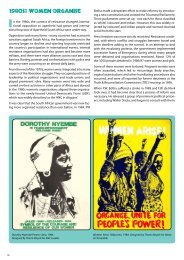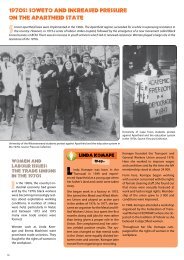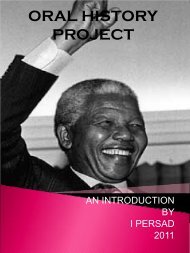Celebrating Women - South African History Online
Celebrating Women - South African History Online
Celebrating Women - South African History Online
Create successful ePaper yourself
Turn your PDF publications into a flip-book with our unique Google optimized e-Paper software.
<strong>Women</strong> and the Black<br />
Consciousness Movement<br />
in the 1970s<br />
T<br />
he Black Consciousness Movement (BCM) was led by<br />
a man called Steve Biko. The BCM was supported by<br />
many female intellectuals, and also appealed to young people.<br />
BCM encouraged all black <strong>South</strong> <strong>African</strong>s to recognize<br />
their inherent dignity and self-worth. In the 1970s, the BCM<br />
spread from university campuses into urban black communities<br />
throughout <strong>South</strong> Africa. A number of women, such as<br />
Baleka Kgositsile and Winnie Mandela were active in both the<br />
Black Consciousness Movement and the ANC underground.<br />
The <strong>South</strong> <strong>African</strong> Student Organisation (SASO), formed<br />
in 1968 by Biko was largely responsible for spreading BCM<br />
among the youth. <strong>Women</strong> like Dr Mamphela Ramphele, Nkosazana<br />
Clarice Dlamini-Zuma and Sam Moodley were active<br />
in this organization.<br />
Along with political action, a major part of the Black Consciousness<br />
Movement was its Black Community Programs.<br />
These Programmes included organizing community medical<br />
clinics, aiding entrepreneurs, and holding “consciousness”<br />
classes and adult education literacy classes.<br />
Biko was banned in 1973. This meant that he was not allowed<br />
to speak to more than one person at a time, was restricted to<br />
certain areas, and could not make speeches in public. It was<br />
also forbidden to quote anything he said, including speeches<br />
or simple conversations, or to otherwise mention him. In spite<br />
of the repression of the Apartheid government, Biko and the<br />
BCM played a large role in inspiring protests, which led to the<br />
Soweto Uprising on 16 June 1976.<br />
The State suppression of the BCM after the Soweto Uprising<br />
in 1976, and Biko’s death while in police custody in 1977,<br />
weakened the organizational base of the movement. In addition,<br />
all the black consciousness organisations were banned<br />
in 1977, including the women’s organisations.<br />
Many of BCM’s supporters went into exile and the majority<br />
joined the ANC and MK in exile. The PAC’s Azanian People’s<br />
Liberation Army (APLA), the successor to Poqo, was also active<br />
in exile. However, the ANC’s MK grew over the years in<br />
international and national stature and became the more<br />
powerful liberation movement.<br />
Winnie Mandela talking at the launch Black <strong>Women</strong>’s Federation in Durban, 1975. Source: Bailey’s <strong>African</strong> <strong>History</strong> Archives.<br />
Black <strong>Women</strong> , s Federation<br />
i<br />
n 1975, some of the women supporters of BCM<br />
formed the Black <strong>Women</strong>’s Federation (BWF) under<br />
the leadership of Fatima Meer. The aim of the BWF was<br />
to bring black women together in a broad front to create<br />
opportunities for themselves. Another prominent member<br />
of this organization was Winnie Mandela.<br />
A year after the formation of the federation, Fatima Meer<br />
was banned. The government also banned a meeting<br />
that was to be held by the BWF and other anti-Apartheid<br />
organisations in Durban in protest of Meer’s banning.<br />
The women of the BWF also expressed solidarity with<br />
the youth and supported them in their demonstrations<br />
against inferior black education. The first student protests<br />
were peaceful, but in 1976, riots broke out in Soweto<br />
against the introduction of Afrikaans as a medium<br />
of instruction in their high schools. The BWF members<br />
were actively behind the students, and when the police<br />
opened fire on the students and 13-year-old Hector Peterson<br />
was killed, they and others bitterly opposed the<br />
brutal police killing of young children.<br />
11



